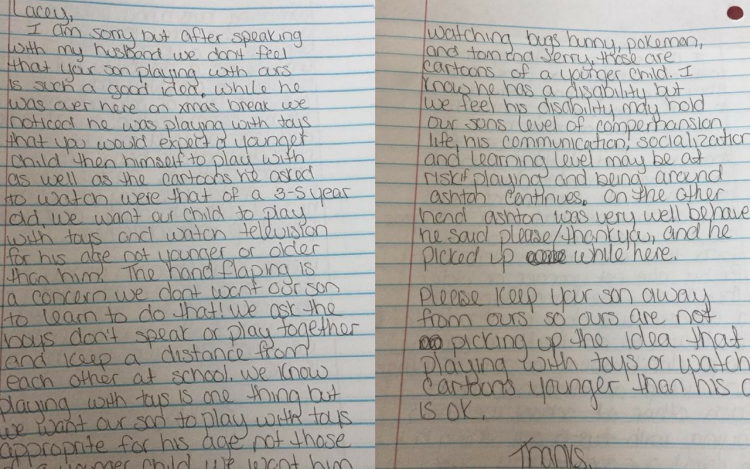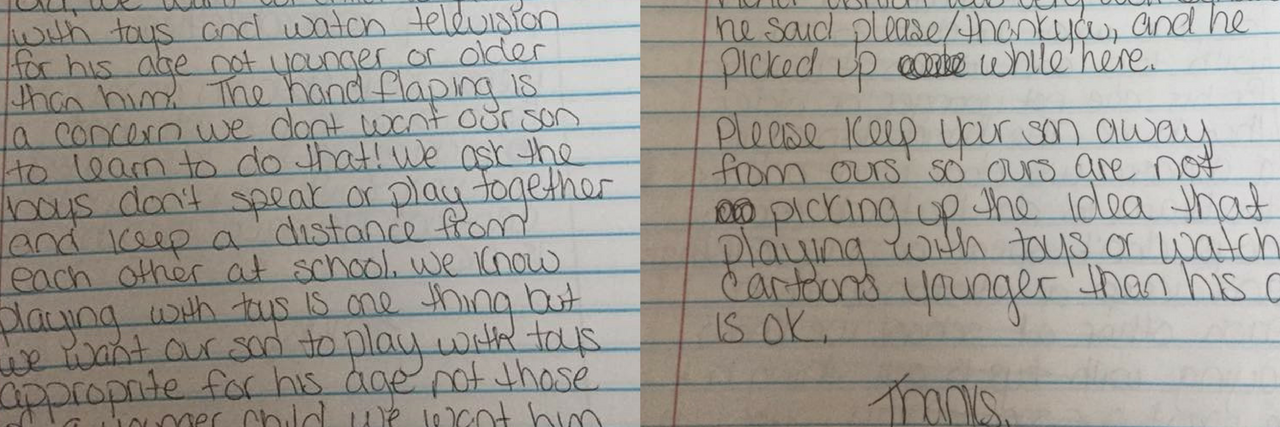Parents Are Outraged by Note Telling Mom of a Kid With a Disability to 'Keep Son Away' From Friend
Update: The Mighty spoke to a source familiar with the matter who said the letter was removed after criticism online and not, as some commenters have suggested, because the letter is a hoax. As of right now, there appears to be no evidence that the letter is fake.
Many parents of kids with disabilities worry about their children making friends. But when the obstacle to kids becoming friends is because of other parents, it can feel especially isolating. On Thursday, Lacey Brandenburg shared an upsetting note her son Ashton received from a friend’s mom. The note attempted to explain why the mom was no longer comfortable with Ashton, who is on the autism spectrum and has other disabilities, being friends with her son.
Brandenburg shared photos of the letter on Facebook, adding, “this is being posted to teach people what parents with special needs children face and what they deal with.” The boy was Ashton’s only friend at school. Editor’s note: Brandenburg has since removed her post. The photos below were saved by The Mighty before the post was taken down.

The letter, which was sent after Ashton went to his friend’s house for a playdate over the holiday break, begins, “I am sorry, but after speaking with my husband we don’t think that your son playing with ours is such a great idea.”
The mom who wrote the note explained her rationale, adding:
The hand flapping is a concern, we don’t want our son to learn to do that!
I know he has a disability but we feel his disability may hold our son’s level of comprehension life, his communication, socialization, and learning level may be at risk if playing and being around Ashton continues.
While the letter included a line praising Ashton for being polite, saying “please” and “thank you” and picking up after himself, the letter focused on what the friend’s mother perceived to be “deficits.”
“Keep your son away from ours so ours are not picking up the idea that playing with toys or watching cartoons younger than his age is OK,” the letter closed.
Studies show that children — with and without disabilities — learn best in an inclusive setting. This can be translated into inclusive societies, classrooms and friendships.
“When you see the disability before the child, it is not only wrong for the child, but it deprives society of all that child has to offer,” Anthony Lake, UNICEF’s former executive director, previously stated. “Their loss is society’s loss; their gain is society’s gain.”
Discriminating against people with disabilities is a pervasive problem connected to negative disability attitudes and stereotypes. Adults with disabilities have a higher unemployment rate and are more likely to fall under the poverty threshold.
Before Brandenburg removed her Facebook post, more than 48,000 people shared the post. Thousands of commenters expressed outrage over the letter, with some adding messages of support for Ashton and his family and others pointing out the letter’s grammatical errors and redundancies.
One commentator and fellow parent, Stacy Lubbert, said, “We have a responsibility as adults to teach our children acceptance and compassion. And excuse me but I still watch Bugs Bunny when given the chance! I didn’t know there was an age limit on cartoons!”
Another parent, Colleen Novit, posted on Facebook, “Please don’t ever be THAT parent. Hate breeds hate friends, don’t break their innocence, let them love!”

